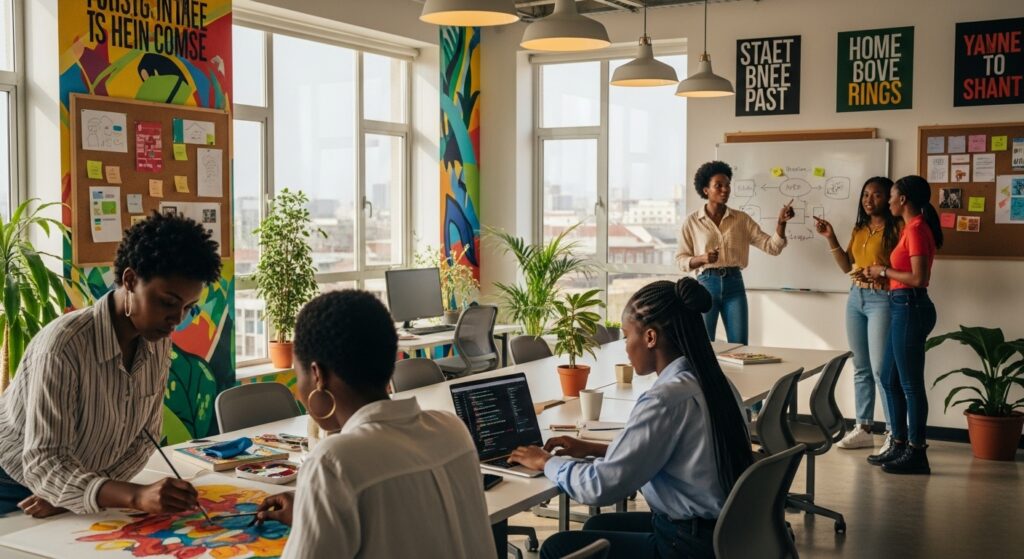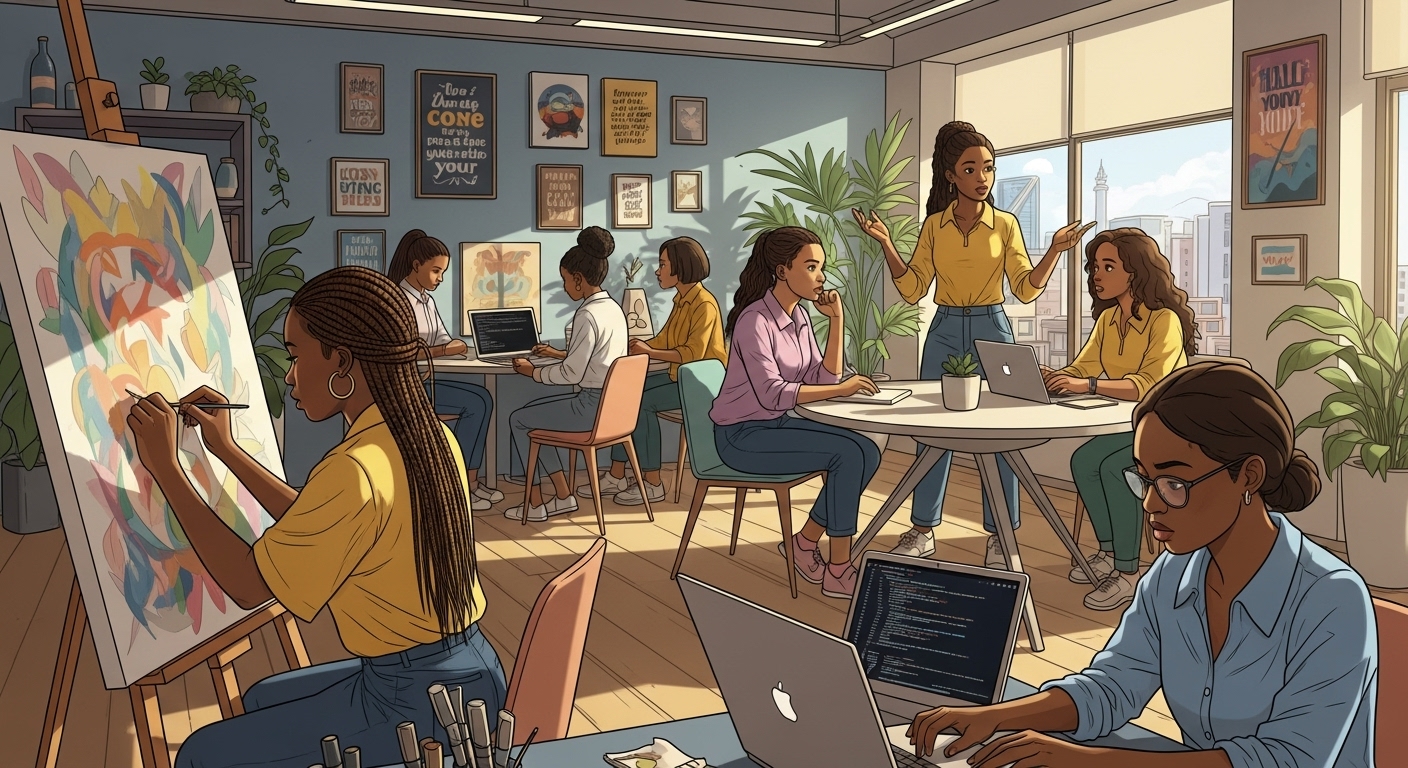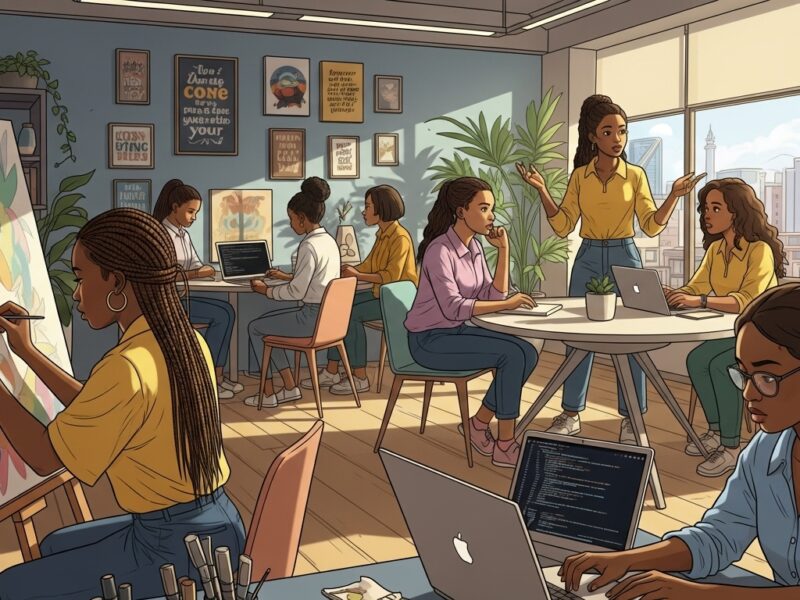Let’s begin with a truth: for many African women, talent isn’t the problem. Access is.
Whether it’s the girl who sketches breathtaking portraits during power outages in rural Uganda, or the woman in Lagos coding her first mobile app while raising a child and dodging condescension — the problem isn’t lack of brilliance. It’s lack of opportunity, visibility, and support.
This is why gender‑focused scholarships matter.
In this post, we spotlight opportunities that don’t just tolerate African girls and women — they’re designed specifically to amplify them. If you’re a woman in Africa who wants to create, innovate, or lead, keep reading. This is your map.
Why Gender-Specific Scholarships Exist (And Why They’re Not Just “Charity”)
Let’s squash the myth early: these programs aren’t about pity or handouts. They exist because the playing field is uneven, and pretending it’s not just keeps it that way.
From underrepresentation in tech to limited funding in the creative arts, women face unique barriers in nearly every sector. These scholarships:
- Correct systemic imbalances
- Empower women with tools, mentorship, and funding
- Build communities of support
- Launch careers that otherwise stall before they start
These are investments, not handouts. And the ROI is powerful.

1. David Oyelowo Leadership Scholarship for Girls (GEANCO Foundation)
- Focus: Young Nigerian girls
- Level: Secondary and pre-university
- Coverage: Full tuition, boarding, medical care, mentorship, leadership development
What makes it powerful:
This isn’t just about school fees — it’s about building leaders from the ground up. Partnered with actor and activist David Oyelowo, the program mentors girls from vulnerable backgrounds and gives them the tools to break cycles of poverty and disempowerment.
Bonus:
Scholars are connected to creative arts opportunities through film and storytelling programs in collaboration with Nollywood and Hollywood creatives.
2. WAAW Foundation Scholarship
- Focus: African women in STEM
- Level: Undergraduate
- Coverage: $500/year (renewable), mentorship, leadership development
Why it matters:
WAAW (Working to Advance African Women) specifically supports African women pursuing STEM degrees who demonstrate financial need and community impact.
What stands out:
Applicants don’t just get money — they’re required to start a STEM outreach chapter in their local community. It’s scholarship + service = real leadership.
3. Tech4Dev Women Techsters Fellowship
- Focus: African women in tech (non-degree, skills-based)
- Level: Beginner to intermediate
- Duration: 1 year
- Coverage: Free training in software dev, cybersecurity, UI/UX, data science
Why it’s game-changing:
It removes the usual barriers: cost, location, and male-dominated classrooms. Plus, it’s designed to get you hired.
Added perks:
Mentorship, job placement, access to international opportunities with partners like Microsoft, GIZ, and the UK Government.
4. Canon Collins Trust – Gender Justice Awards
- Focus: Southern African women pursuing degrees related to social justice, gender equity, and law
- Level: Postgraduate
- Coverage: Tuition, partial living expenses, access to research funding
Why apply:
If you’re passionate about gender rights, social reform, or legal empowerment, this program supports not only your education but your advocacy.
Real-life impact:
Many alumni now work in policy, activism, and legal reform across SADC countries.
5. UNESCO – L’Oréal Women in Science Fellowship (Sub-Saharan Africa)
- Focus: Women in scientific research
- Level: PhD and Postdoc
- Coverage: Up to €10,000 in research grants
What’s brilliant about it:
It celebrates African women scientists — and funds them to keep researching at a high level. In fields like microbiology, climate science, and public health, these fellowships bridge the gender gap in African science labs.
6. AWJP/DW Akademie Gender and AI Fellowship
- Focus: Women journalists and creatives exploring tech, AI, and gender
- Level: Project-based (short-term fellowship)
- Coverage: Stipend, mentorship, publishing opportunity
Why it’s unique:
Blends storytelling with technology. If you’re a woman working in media, film, art, or design and want to explore gender in the AI age, this is your stage.
Past projects include:
- AI-generated art exhibitions
- Feminist chatbot development
- Investigative documentaries on tech bias
7. Ashinaga Africa Initiative (for Orphaned Girls and Boys)
- Focus: Highly motivated students who have lost one or both parents
- Level: Undergraduate (study abroad)
- Coverage: Full tuition, travel, living stipend, mentoring
Why include it:
Girls from vulnerable backgrounds — especially orphans — often have zero support navigating higher education. Ashinaga offers long-term guidance, not just funding.
Their holistic approach is particularly powerful for young women navigating trauma, poverty, and academic pressure.
8. SHE Leads Africa Accelerator
- Focus: Female entrepreneurs
- Format: Hybrid accelerator (training + pitch competition)
- Perks: Mentorship, funding access, investor exposure
Perfect for:
Creative entrepreneurs in fashion, beauty, content, and tech who are scaling a business but need strategy and capital.
Why it’s different:
The content is designed for women, tackling real challenges like investor bias, work-life balance, and gendered marketing hurdles.
What Makes a Strong Application for These Scholarships?
Here’s what reviewers are really looking for:
✦ Authentic Purpose
Don’t write like you’re trying to impress. Write like you mean it. Show how your goals relate to your identity, your community, and the future you want to build.
✦ Creative Evidence
Got an art portfolio? GitHub profile? Link it. Got a TikTok channel where you teach girls to code? Mention it. You don’t have to be traditional — just intentional.
✦ Leadership Without a Title
Maybe you’re not a CEO or founder — but you started a poetry club for girls, or you tutor younger kids, or you built a website for your aunt’s business. That is leadership.
Tips for Female Applicants Navigating These Spaces
- Don’t downplay your achievements. If you led something, say so. Don’t shrink.
- Apply even if you feel “underqualified.” The bar isn’t perfection. It’s potential.
- Seek female mentors. Reach out to past recipients. Many will help.
- Own your voice. Whether you’re an artist or an AI coder — speak in your tone, not what you think they want to hear.
Final Thoughts: You Belong Here
To every African girl sketching her dreams in a notebook or coding with a borrowed laptop — you are not asking for too much. You’re asking for what you deserve: a chance.
These scholarships don’t just believe in you — they were built for you.
So apply boldly. Speak freely. And when that opportunity arrives? Don’t apologize. Walk in like you were always meant to be there.
Because you were.

